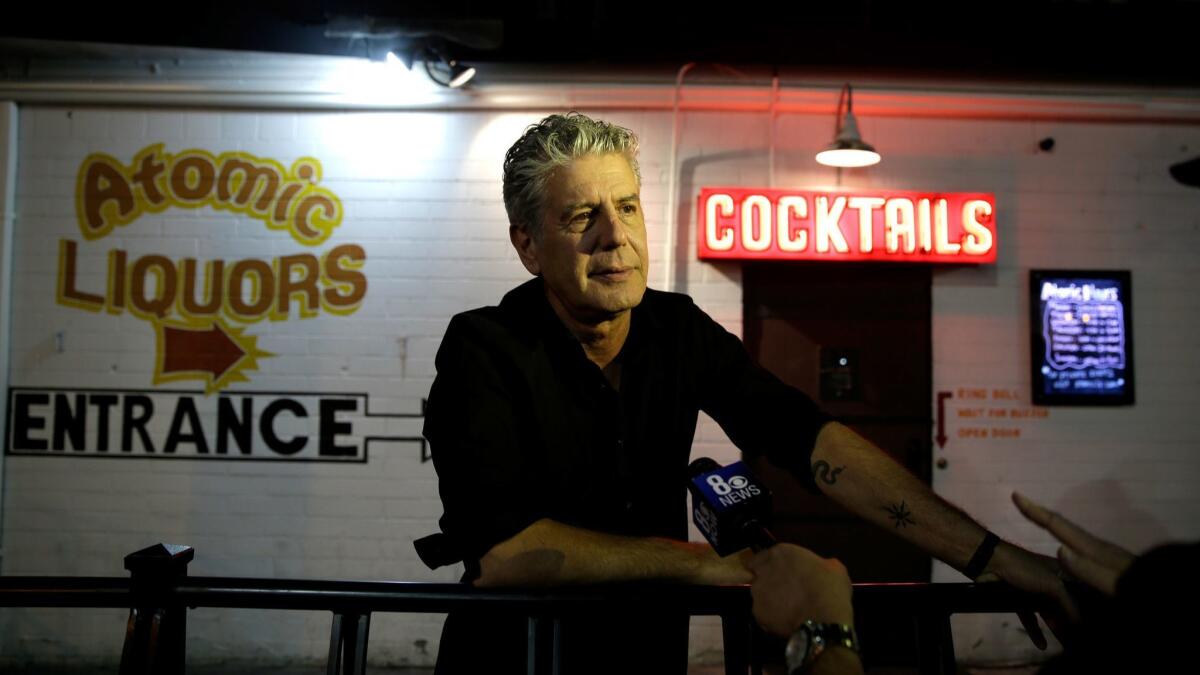Column: Anthony Bourdain was the eternal compadre of overlooked Latinos

It wasn’t a fellow journalist or social media follower who alerted me to the death of Anthony Bourdain early Friday morning. It was a text from my cousin Placido, a blue-collar-to-the-core Frito-Lay delivery driver. Placido is a man with little use for the frou-frou excesses of foodies, someone who mocked our friend for putting pomegranate seeds in guacamole.
That I got the news from him sums up Bourdain’s appeal and ultimate legacy. Bourdain was the foul-mouthed Jeremiah of the food world, someone who savaged its pretensions and hypocrisies and created a persona now copied by Eddie Huang, Action Bronson and too many other celebrity chefs. But Bourdain transcended the culinary bubble in ways no one else has. People like my cousin never gave a lick about foodie culture; still, they revered Bourdain.
His TV shows — “No Reservations,” “The Layover” and most recently “Parts Unknown” — were easy to enjoy. A whip-smart chef travels the world to eat with the gentry and rabble alike — what’s not to like? But he wasn’t a mere gastronomy tourist. His programs ultimately were about the dignity of humans. Bourdain tackled politics and culture and history and music with ease and genuine curiosity because his muse was working-class people and the food that they sweat over making and smile while eating. He broadcast their hopes and fears and joy with a depth and warmth that the mainstream media still really doesn’t bother to learn or seek out.
Bourdain understood his privilege and used it as a cudgel to force Americans to think about our role in the world.
Bourdain understood his privilege and used it as a cudgel to force Americans to think about our role in the world. He was particularly unsparing to our hypocrisies on Latino immigration. He spoke throughout his career about how Latinos (since he was a New Yorker, specifically Ecuadoreans, Salvadorans and Mexicans from the state of Puebla) were his eternal compadres, because of their work ethic and hilarity and giving ways. Anyone who opposed more of them coming into the United States, he said, was simply deranged.
“Mexicans do much of the work in this country that Americans, probably, simply won’t do,” he wrote a couple of years ago. “In nearly 30 years of cooking professionally, just about every time I walked into a new kitchen, it was a Mexican guy who looked after me, had my back, showed me what was what.”
I only met Bourdain once, when I appeared on the Los Angeles episode of “Parts Unknown” that aired last year. Comedian Al Madrigal and I talked Mexican American identity and immigration with Toño (“Tony” in Spanish) over a plate of the legendary taquitos of Cielito Lindo on Olvera Street. We wanted to film quickly because Bourdain was in pain, having just undergone an hours-long tattoo session on his leg.
Full coverage of Anthony Bourdain’s death »
The shoot wrapped up at midnight. Los Angeles would not let him leave. As a driver idled on Cesar Chavez Avenue waiting for him, at least a dozen people sought an audience with their hero. Hipsters and homeless. Workers about to begin a shift, or just ending it. Bus riders. Everyone wanted to share their favorite episode. Not only did Bourdain listen, he was kind enough to pose for photos.
We can all learn from Bourdain — not just that we should see how the other half lives, but that we should break bread or naan or injera with them and listen. May you rest in peace, Toño; I’ll snack on a salsa-drenched Cielito Lindo taquito in your honor soon enough.
Twitter: @GustavoArellano
More to Read
A cure for the common opinion
Get thought-provoking perspectives with our weekly newsletter.
You may occasionally receive promotional content from the Los Angeles Times.











